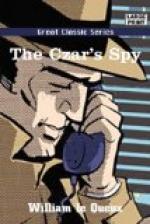After smoking an hour we went across to the Empire, where we spent the evening in the grand circle, meeting many men we knew and having a rather pleasant time among old acquaintances. If a man who had lived the club life of London returns from abroad, he can always run across someone he knows in the circle of the Empire about ten o’clock at night. Jack was, however, not his old self that he had been before dinner. His brow was now heavy and thoughtful, and he appeared deeply immersed in some intricate problem, for his eyes were fixed vacantly when opportunity was afforded him to think, and he appeared to desire to avoid his friends rather than to greet them.
After the theater I induced him to come round to the Cecil, and in the wicker chair in the big portico before the entrance we sat to smoke our final cigars. It is a favorite spot of mine when in London, for at afternoon, when the string band plays and the Americans and other cosmopolitans drink tea, there is a continual coming and going, a little panorama of life that to a student of men like myself is intensely interesting. And at night it is just as amusing to sit there in the shadow and watch the people returning from the theaters or dances and to speculate as to whom and what they are. At that one little corner of London just off the Strand you see more variety of men and women than perhaps at any other spot. All grades pass before you, from the pushful American commercial man interested in a patent medicine, to the proud Indian Rajah with his turbaned suite; from the variety actress to the daughter of a peer, or the wife of a millionaire pork-butcher doing Europe.
“You’ve been a bit down in the mouth to-night, Jack,” I said presently, after we had been watching the cabs coming up, depositing the home-coming revelers from the Savoy or the Carlton.
“Yes,” he sighed. “And surely I have enough to cause me—after what I’ve heard from Bartlett.”
“What! Did the facts he told us convey any bad news to you?” I inquired with pretended ignorance.
“Yes,” he said hoarsely, after a brief pause. Then he added: “Bartlett said you could tell me what happened up in Scotland, where Leithcourt had shooting. Tell me everything,” he added with the air of a man in whom all hope is dead.
“Well,” I began, “the Leithcourts took Rannoch Castle, close to my uncle’s place, near Dumfries. I got to know them, of course, and often shot with his party. One day, however, I was amazed to notice in one of the rooms the photograph of a lady, the exact counterpart of that picture which, I recollect, I told you when in Leghorn I had found torn up on board the Lola. You recollect what I narrated about my strange adventure, don’t you?”
“I remember every word,” was his answer. “Go on. What did you do?”
“Nothing. I held my tongue. But when I discovered that the fellow who called himself Woodroffe—the man who had represented himself as the owner of the Lola, and who, no doubt, had had a hand in breaking open Hutcheson’s safe in the Consulate—was engaged to Muriel, I became full of suspicion.”




